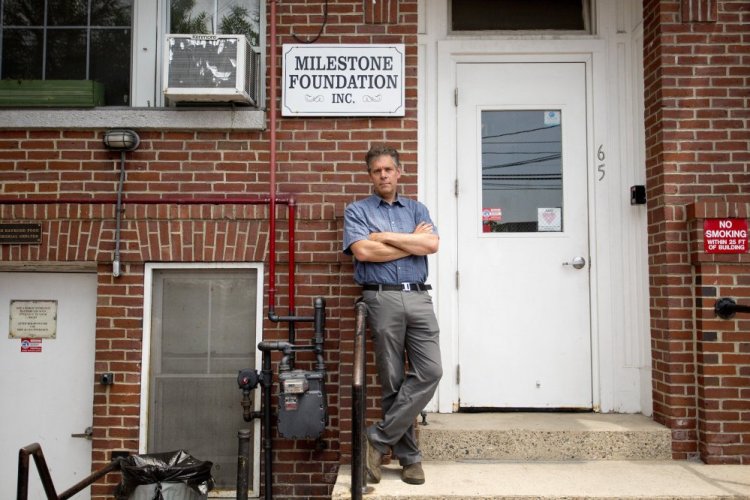An estimated 8,300 Mainers with substance use disorders will lose access to treatment programs if the Affordable Care Act is repealed, according to an analysis published Wednesday by researchers at New York University and Harvard Medical School.
The loss of coverage would come amid an opioid crisis in which Mainers are dying from drug overdoses at a rate of more than one person per day, according to state statistics. A record 286 Mainers died of drug overdoses from Jan. 1 through Sept. 30 of last year, according to the Maine Attorney General’s Office.
Maine currently has limited treatment options, especially for the uninsured, but many in the health care industry and government are working on plans to expand access. If the ACA were repealed, it would wipe out some gains the state is making to improve access to treatment, experts say.
“You can just feel the tension and anxiety in the air about the ACA,” said Bob Fowler, executive director of the Milestone Foundation, which operates a detox center in Portland and a drug treatment center in Old Orchard Beach. “It’s frustrating as can be. (Repealing the law) would be a major step backward.”
Fowler said a significant number of people treated at Milestone – he could not provide the percentage – have health insurance through the ACA.
The data analysis by Sherry Glied, dean of the Robert F. Wagner Graduate School of Public Service at NYU, and Richard Frank, a professor of health economics at Harvard Medical School, shows that in addition to the roughly 8,300 people with substance abuse disorders who would lose coverage, about 11,000 Mainers with mental health problems also would lose access to services through the ACA’s marketplaces. Nationwide, the analysis estimates that about 4 million would lose access to mental health and substance abuse services if the ACA were repealed and a similar replacement was not signed into law.
The researchers used statistical modeling to make the estimates about Maine and seven other states where the opioid crisis is most severe, including West Virginia, Pennsylvania, Nevada, Tennessee, Ohio, Alaska and Arizona. The researchers compared federal surveys of those who reported drug abuse and poor mental health and compared the surveys with statistics regarding how many have health benefits through Medicaid expansion or the ACA marketplace.
The ACA marketplace is where those who can’t obtain benefits through an employer, such as self-employed or part-time workers, can purchase subsidized insurance. The ACA mandates that insurers cover mental health and substance abuse treatment services.
More than 80,000 Mainers have health benefits through the ACA marketplace, according to federal data. But Maine is one of 19 states that have not expanded Medicaid. More than 20 million Americans have health care coverage through the ACA, either through marketplace coverage or Medicaid expansion.
Congress is in the early stages of debating a repeal of the ACA, a key goal for Republicans, but there are some signs that repeal efforts could be bogged down, despite the party’s control of the House, Senate and – starting on Jan. 20 – the executive branch when President-elect Donald Trump takes office.
Republicans long have said their intention is to repeal the ACA immediately, but whether and how to replace President Obama’s signature health care law is the subject of increasing debate. Maine Sen. Susan Collins, a moderate Republican, has said she believes it would be best to repeal the law only if a comprehensive replacement plan is agreed upon, to ensure people don’t lose health coverage.
Other Republicans have said they want to move forward with the repeal, while Democrats want to preserve the law. Trump said Wednesday that the law should be repealed and immediately replaced, although he didn’t explain how a complex replacement bill could be completed in a matter of weeks. Republicans have yet to come up with a viable replacement plan.
Glied said in a phone interview Wednesday that without insurance to help pay for the costs of substance abuse treatment and mental health counseling, patients will go without treatment entirely.
“The evidence shows that these patients are especially sensitive to out-of-pocket costs,” Glied said. “If it’s expensive, they don’t go.”
She said that considering the severity of the problem, putting “roadblocks” in front of patients will cause people to lose access to treatment.
About 25,000 to 30,000 Mainers want to enter drug treatment programs but believe they don’t have access, according to surveys for the U.S. Substance Abuse and Mental Health Services Administration.
Malory Shaughnessy, executive director of the Alliance for Addiction and Mental Health Services, Maine, said repealing the ACA would be devastating to thousands of Mainers who need mental health or addiction treatment.
“This is going to be huge if the ACA is repealed and not immediately replaced,” she said. “The problems that we’re having are going to be compounded.”
Sen. Angus King weighed in on the analysis Wednesday, saying repealing the ACA could have “catastrophic” consequences.
“Congress should do everything it can to expand treatment options for people – not strip them of the critical resources that could save their lives,” Maine’s independent senator said in a written statement.
King and Collins lobbied for the 21st Century Cures Act – approved late last year – that provides $1 billion in funding for drug treatment over two years to help address the opioid crisis.
But Glied noted that if the ACA were repealed, it would remove $5.5 billion per year that helps pay for treatment programs and mental health services, far surpassing the $1 billion that the 21st Century Cures Act funds.
Send questions/comments to the editors.




Comments are no longer available on this story